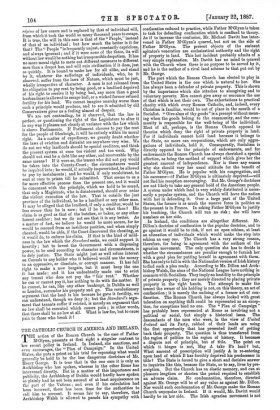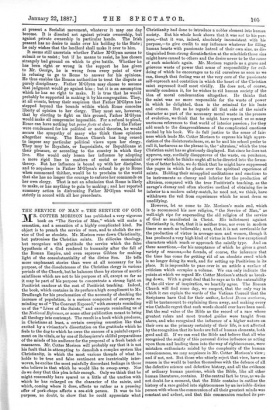so plainly had he not been assured of at least
acquiescence on an adverse claim. No condemnation, therefore, directed the part of the Vatican ; and even if his calculation had against Mr. George will be of any value as against Mr. Dillon. been incorrect, there has been time for the authorities to Nor would such condemnation of Mr. George make the Boman call him to account. It seems fair to say, therefore, that Church unpopular in Ireland. If it would, Mr. Davitt would Archbishop Walsh is allowed to parade his sympathy with hardly be on her side. The Irish agrarian movement is not regime of law ceases and is replaced by that of individual will, confiscation reduced to practice, while Father M'Glynn is taken from which it took the world so many thousand years to escape. to task for defending confiscation which is confined to theory.
It is true, the will in this case is that of the "People," instead As if to increase the confusion, Mr. Michael Davitt has inter- of that of an individual ; but how much the better is it for vened in Father M.Glynn's quarrel, but not on the side of
that ? The " People " is frequently unjust, constantly capricious, Father M'Glynn. The present objects of the eminent and always ignorant ; and if it were none of the three, its will agitator's veneration are ecclesiastical authority and the right without law would be nothing but irresponsible despotism. It has of property in land. This last incident probably admits of a no more moral right to mete out different measures to different very simple explanation. Mr. Davitt has no mind to quarrel men than a despot has, and will ruin civilisation if it does, just with the Church when there is no purpose to be served by it, as quickly. It is bound to make law for all alike, and stand and he is the author of a rival land scheme to that put out by by it, whatever the sufferings of individuals, who, be it Mr. George. observed, suffer from the laws of Nature, which must be just, The part which the Roman Church has elected to play in wholly irrespective of character. A man is not released from the United States is the one which is natural to her. She his obligation to pay rent by being good, or a landlord deprived has always been a defender of private property. This is shown of his right to receive it by being bad, any more than a good by the importance which she attaches to almsgiving and to husbandman is allowed to escape hail, or a wicked farmer refused voluntary poverty. Men cannot give away or renounce the use fertility for his land. We cannot imagine anarchy worse than of that which is not their own. The exhortations to practical such a principle would produce, and to see it admitted by old charity with which every Roman Catholic, and, indeed, every Christian is familiar, would be out of place in the mouth of a We are not contending, be it observed, that the law is Socialist. " Give alms of thy goods " is a precept without mean- perfect, or questioning the right of the Legislature to alter it ing when the goods belong to the community, and the coma- in any way it pleases not clearly at variance with the law which munity is responsible for the well-being of the individual. is above Parliaments. If Parliament chooses to pay the rent Most of all, perhaps, is the Roman Church opposed to for the people of Glenbeigh, it will be entirely within its moral theories which deny the right of private property in land. right. As a matter of expediency, we greatly doubt whether For if individuals cannot hold land because it belongs to the laws of eviction and distraint are anywhere very wise. We the State, no more can corporations, which are only aggre- do not see why landlords should be special creditors, and think gations of individuals, hold it. Consequently, Socialism is the present system at once too violent and too weak. Why directly opposed to the principle of endowments, and for should not rent be a debt like any other, and recoverable by the endowments the Roman Church has always cherished a special same means ? If it were so, the tenant who did not pay would affection, as being the method of support which gives her the be taken into the County-Court ; the circumstances would greatest amount of independence. Nor is there any reason be inquired into ; he would, if actually impoverished, be allowed why she should vary her usual attitude for the benefit of to pay by instalments ; and he would, if only recalcitrant, be Father M'Glynn. He is popular with his congregation, and sent at once to prison till he submitted. That seems to us a his successor—if Father M'Glynn is ultimately deprived—will far more effective process than the present one, and it would not find his reception encouraging. But Mr. George's doctrines be consonant with the principle, which we hold to be sound, are not likely to take any general hold of the American people. that only a Magistrate, who is disinterested, should ever order A system under which land is very widely distributed is neces- the violent execution of the law. That is outside the just sarily a popular system, and the Church will have the nation province of the individual, be he a landlord or any other man, with her in defending it. Over a large part of the United It may be alleged that the landlord, if only a creditor, would be States, the farmer is as much the reserve force in politics as less secure than he is now ; but if he is, what then ? His the peasant is in France. In asking Father M'Glynn to justify claim is as good as that of the butcher, or baker, or any other his teaching, the Church will run no risk ; she will have honest creditor ; but we do not see that it is any better. As numbers on her side. a matter of fact, we believe he would be more secure, for he In Ireland, the conditions are altogether different. Mr.
descendants of the men who were, in the view of United at present a Socialist movement, whatever it may one day become. It is directed not against private ownership, but against private ownership in particular hands. The Irish peasant has no desire to make over his holding to the State ; he only wishes that the landlord shall make it over to him.
It seems still uncertain whether Father M'Glynn means to submit or to resist ; but if he means to resist, he has chosen strangely bad ground on which to give battle. Whether he has been right or wrong in the support he has given to Mr. George, he is wrong from every point of view in refusing to go to Rome to answer for his opinions. He thus enables the Roman authorities to treat the dispute as purely disciplinary. Father M'Glynn may choose to assume that judgment would go against him ; but it is an assumption which he has no right to make. It is true that he would probably be supported in making it by his congregation. They, at all events, betray their suspicion that Father Al‘Glynn has stepped beyond the bounds within which Rome concedes liberty of opinion to her clergy. They must see, however, that by electing to fight on this ground, Father M'Glynn would make all compromise impossible. For a refusal to plead, Rome can have nothing but peine forte et dare. If the Father were condemned for his political or social theories, he would secure the sympathy of many who think those opinions altogether wrong. The Roman Church has long ceased to impose any particular political views upon her clergy. They may be Royalists, or Imperialists, or Republicans at their pleasure, or according to the country in which they live. She would only lessen her influence by adopting a more rigid line in matters of social or economical theory. But her influence is bound up with her discipline, and to acquiesce in Father M'Cilynn's refusal to go to Rome when summoned thither, would be to proclaim to the world that she has no longer the courage to enforce her commands on her own clergy. That is not an admission that Rome is likely to make, or has anything to gain by making ; and her reported summary action in disf rocking Father M‘Glynn would be strictly in accord with all her precedents.



































 Previous page
Previous page